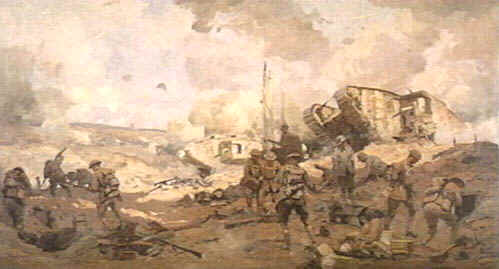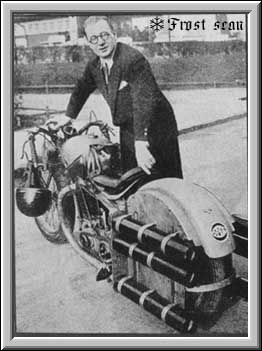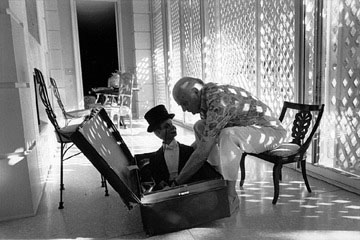NAVIGATION COLUMN
Home Page
Yahoo Groups:
History 1 Day 2
Nuremburg Data
Daily History Pages:
In Calendar Form
FAIR USE NOTICE: This site could contain copyrighted material the use of which has not always been specifically authorized by the copyright owner. We are making such material available in our efforts to advance understanding of historical, political, human rights, economic, democracy, scientific, environmental, and social justice issues, etc. We believe this constitutes a 'fair use' of any such copyrighted material as provided for in section 107 of the US Copyright Law. In accordance with Title 17 U.S.C. Section 107, the material on this site is distributed without profit to those who have expressed a prior interest in receiving the included information for research that could include educational purposes. If you wish to use copyrighted material from this site for purposes of your own that go beyond 'fair use', you could most likely need to obtain permission from the copyright owner.
|
September 30

1568 Eric XIV, king of Sweden, is deposed after showing definite signs of madness.

1630 Death: John Billington, the first criminal to be executed in the American colonies. One of the original pilgrims who sailed to the New World on the Mayflower, Billington is hanged for having shot another man during a quarrel.

1659 Peter Stuyvesant of New Netherlands forbids tennis playing during religious services.
1703 War of the Spanish Succession: The French, at Hochstadt suffer only 1,000 casualties to the 11,000 of their opponents, the Austrians of Holy Roman Emperor Leopold I.

1770 Death: English revivalist George Whitefield, 56, in Newburyport, Massachusetts, while on his seventh visit to America. Regarded as the most striking orator to come out of 18th century English revivalism, Whitefield's last spoken words are: 'I had rather wear out, than rust out.'

1777 US Revolutionary War: US Congress flees to York, Pennsylvania, as British forces advance.
1846 The first anesthetized (ether) tooth extraction is performed by Dr. William Morton in Charleston, Massachusetts.

1857 The US occupies Sand, Baker, Howland and Jarvis Islands, south of Hawaii.

1863 Birth: Reinhard von Scheer, German admiral who will command the German fleet at the Battle of Jutland.
1864 US Civil War: Confederate troops fail to retake Fort Harrison from Union forces during the siege of Petersburg.

1867 The Midway Islands are formally declared a US possession.

1870 Birth: Jean Perrin, in France, physicist; will study Brownian motion (Nobel 1926).
1878 The first Portuguese immigrants arrive in Hawaii.

1880 Henry Draper takes the first photograph of the Orion Nebula. Note: The above is not Henrys photo.
1882 Birth: Hans Geiger, German physicist, will CO-invent the Geiger Counter. Aside: What are the chances that his partner's name will be Counter?
1882 Water power is first used to generate electricity, in Wisconsin.

1885 Bechuanaland becomes a British protectorate.
1787 The USS Columbia leaves Boston and begins the trip that will make it the first American vessel to sail around the world.
1883 Birth: Berhard Rust; will join the NSDAP in 1922 and become the provincial party boss of Hanover; Minister of science, education and popular development, 1934-1935. Will commit suicide May 8, 1945.

1889 The Wyoming State convention approves a constitution that includes a provision granting women the right to vote. Formally admitted into the union the following year, Wyoming thus becomes the first state in the history of the America to allow its female citizens to vote. That the isolated western state of Wyoming should be the first to accept women's suffrage is a surprise. Leading suffragists like Susan B. Anthony and Elizabeth Cady Stanton are Easterners, and they assumed that their own more progressive home states would be among the first to respond to the campaign for women's suffrage. Yet the people and politicians of the growing number of new Western states prove far more supportive than those in the East. In 1848, the legislature in Washington Territory became the first to introduce a women's suffrage bill. Though the Washington bill was narrowly defeated, similar legislation succeeded elsewhere, and Wyoming Territory was the first to give women the vote in 1869, quickly followed by Utah Territory (1870) and Washington Territory (1883). As with Wyoming, when these territories became states they preserved women's suffrage. By 1914, the contrast between East and West had become striking. All of the states west of the Rockies had women's suffrage, while no state did east of the Rockies, except Kansas. Why the regional distinction? Some historians suggest western men may have been rewarding pioneer women for their critical role in settling the West. Others argue the West had a more egalitarian spirit, or that the scarcity of women in some western regions made men more appreciative of the women who were there while hoping the vote might attract more. Whatever the reasons, while the Old West is usually thought of as a man's world, a wild land that was 'no place for a woman', Westerners proved far more willing than other Americans to create states where women were welcomed as full and equal citizens.
1895 France proclaims a protectorate over Madagascar.
1911 Italy declares war on Turkey over control of Tripoli.
1914 WW1: Before Grand Duke Nikolai, the Russian supreme commander, can move through Poland into Silesia, the heart of Germany's mineral resources, Hindenburg attacks their left flank.
1917 WW1: Sep 30-Oct 17 Lance Corporal Adolf Hitler takes a well deserved home leave in the family stomping grounds of Spital. (Maser)

1918 WW1: "After smashing through the Hindenburg Line east of the old battlegrounds of the Somme, the Allies turn their attention northward where Hitler and his regiment are stationed. Because of the growth of American forces in France, a French army is moved north to join the British for a combined attack against the Germans around Ypres again.
On September 29, the Allies open up with a barrage of high explosives shells intermingled with mustard gas. Short of troops, Ludendorff has been forced to take men from one part of his line to protect another and there were now only five divisions left to defend the area. The Germans have no choice but to fall back.

After a few days of fighting along a twenty-mile front, the Germans are forced back in some places eight miles and another 10,000 prisoners are taken along with scores of heavy guns. The Allied soldiers advance steadily but this time their most difficult opposition is the rain. It rains nearly as hard as it had during the Third Battle of Ypres the year before. The troops move across an eerie, fog-shrouded wasteland. "I remember well," Hitler would say, "that we had some very hard fighting [in] October 1918, and then...came the rain, and everything was washed out."
1918 Prince Max von Baden is named head of the new German government.
1923 Hitler visits the Wagner family and Houston Stewart Chamberlain at Wagner's home in Bayreuth. When he returns to Munich, he finds a letter from Chamberlain praising him as a Messiah and comparing Chamberlain himself with John the Baptist. "At one blow you have transformed the state of my soul," Chamberlain writes. "That Germany in her hour of need has produced a Hitler testifies to its vitality. Now at last I am able to sleep peacefully and I shall have no need to wake up again. God protect you!" (Olden)
1928 Birth: Elie Wiesel, Holocaust survivor, writer; will be best known for his first book Night about his own experiences in concentration camps. (Souls on Fire), Nazi hunter (Nobel 1986).

1929 The first manned rocket plane flight is undertaken by auto maker Fritz von Opel, who apparently put rockets on anything that moved.
1933 Holocaust: One hundred fifty-five Jewish traders are ousted from the Berlin Stock Exchange.
1935 Holocaust: All Jewish civil servants in Germany are placed on leave. (Persecution)

1938 Munich Conference: The Munich Agreement is signed by Chamberlain, Hitler, Daladier and Mussolini. The Czechoslovakian Sudetenland is ceded to Germany. Czechoslovakia reluctantly bows to the circumstances and accepts the Munich Agreement. After returning to England, Chamberlain declares, "I believe it is peace for our time." Note: In the House of Commons the Munich Agreement is denounced by Winston Churchill as a total and unmitigated defeat.
1938 Holocaust: A new wave of anti-Jewish riots break out in Poland. (Edelheit)
1939 Church and Reich: German Minister of Ecclesiastical Affairs Hanns Kerrl sends word to all church authorities suggesting that all church bells should ring during the noon hour for seven days "out of grateful commemoration of the victory (over Poland) and of the dead."
1939 Holocaust: About 400,000 of the 600,000 people classified as Jews in Germany have already fled the country. Of the 200,000 who remain, about 150,000 will die in the concentration camps.
1939 WW2: General Gamelin issues orders for the token French army, engaged in Operation Saar, to begin withdrawing from Germany during the night. The attack had only penetrated five miles into Germany; a halfhearted attempt to relieve pressure on the Poles without actually running much risk of actual combat. (Duffy)
1941 Holocaust: Himmler sets out on a tour of the conquered areas of southern Russia. He takes with him Dr. Albert Widmann, head of the chemical section of the RSHA Criminal Technical Institute and one of the prime inventors of the new gas truck that recycled its own exhaust. Since it was easier to modify existing trucks in the field to serve as mobile gas chambers than to produce new trucks in Germany and then transport them to the East, Widmann went along as a technical consultant. (Architect)

1941 WW2: Guderian's and Hoth's panzers rejoin Army Group Center, and the advance on Moscow is resumed. The Germans now face a rejuvenated enemy that has profited from the respite Hitler has given them to construct strong defenses and move large numbers of troops to defend the capital. (Duffy)
1942 WW2: Hitler speaks in Berlin. "…I myself very much regret not being able to stand oftener before the nation…I am naturally afraid that my speeches thereby are becoming worse rather than better, for in this regard practice is necessary. My time is unfortunately much more limited than the time of my worthy adversaries. Naturally he who can travel around the world for weeks at a time, with a broad sombrero on his head, wearing a white silk shirt here, and some other outfit there, can naturally occupy himself much more with..."

1943 Holocaust: A work unit of 325 Jews and Soviet prisoners, who were being forced, in chains, to dig up burn victims of the massacre at Babi Yar, near Kiev, revolt when they too are about to be killed. Only 14 survive the revolt. (Atlas)
1944 WW2: Calais is reoccupied by the Allies.

1946 Nuremberg War Crimes Trials: 22 Nazi leaders are found guilty of war crimes at Nuremberg, Von Ribbentrop and Goering are sentenced to death by hanging by the Nuremberg trial.
1949 The Berlin Airlift was officially halted after 277,264 flights. The airlift had taken 2.3 million tons of food into the western sector despite the Soviet blockade.
1950 The first congress of the International Astronautical Federation opens in Paris.

1950 Korea: UN forces cross the 38th parallel separating North and South Korea as they pursue the retreating North Korean Army.
1954 NATO nations agree to arm and admit West Germany.
1959 Death: John H. Kliegl, developer of the Klieg light, at 89.

1960 Nigeria gains independence.
1962 James H. Meredith, an African-American, is escorted onto the University of Mississippi campus by US Marshals, setting off a deadly riot during which two men are killed before the racial violence is finally quelled by more than 3,000 soldiers. Meredith nonetheless enrolls the next day.
1963 The Soviet Union publicly declares itself on the side of India in their dispute with Pakistan over Kashmir.
1965 President Lyndon B. Johnson signs legislation that establishes the National Foundation for the Arts and the Humanities.
1966 Botswana (Bechuanaland) gains its independence from Britain.
1966 Albert Speer and Baldur von Schirach are released at midnight from Spandau prison after completing their 20-year sentences. Note: Speer was the Nazi minister of armaments and von Schirach was the founder of Hitler Youth.
1967 The USSR's Kosmos 186 and 188 complete the first automatic docking.
1971 The Soviet Union and the United States sign pacts that are aimed at avoiding an accidental nuclear war.

1978 Death: Edgar Bergen, ventriloquist, at 75.

1978 Death: Charlie Mcarthy, age unknown.
1980 Iran rejects a truce call from Iraqi President Saddam Hussein.
1984 107 Moslem extremists are sentenced to prison for their actions after the assassination of President Anwar Sadat in 1981.
1985 Four Soviet diplomats are kidnapped in Beirut by the Islamic Liberation Organization. One of the diplomats is killed and the other three are later released.
1986 The US releases accused Soviet spy Gennadiy Zakharov, one day after the Nicholas Daniloff had been released by the Soviets.
1987 Mikhail S. Gorbachev retires President Andrei A. Gromyko from the Politburo and fires other old-guard leaders in a shakeup at the Kremlin.
1989 Thousands of East Germans begin emigrating under an accord between the NATO nations and the Soviet Union.
1990 The Soviet Union and South Korea open diplomatic relations.
1991 Haiti's first freely elected president, Jean-Bertrand Aristide, is overthrown by Brigadier General Raoul Cedras. Aristide will later be returned to power.
1992 Moscow banks distribute privatization vouchers aimed at turning millions of Russians into capitalists.
1993 US chairman of the Joint Chiefs of Staff Colin Powell retires.
1997 France's Roman Catholic Church apologizes for its silence during the persecution and deportation of Jews by the pro-Nazi Vichy regime.
1999 In Tokaimura, Japan, radiation escapes a nuclear facility after workers accidentally set off an uncontrolled nuclear chain reaction.
1999 Russia sends troops into the breakaway republic of Chechnya.

2001 Around 500 people in the US and elsewhere have been arrested or detained in connection with the 11 September terrorist attacks.

2001 The Taliban say explicitly for the first time that Osama bin Laden is still in Afghanistan and is being kept in a secret location.
2001 The Pakistani president says that even under threat of US military strikes, hopes are "very dim" bin Laden will be surrendered.
2001 Afghanistan opposition leaders claim that territory has been gained and hundreds of Taliban soldiers have defected during the three days of fighting in northern mountains.
2001 Foreign aid workers in Iran stockpile emergency rations for possible waves of Afghan refugees.
2001 UK PM Tony Blair promises measures to speed up extradition procedures as part of a package of emergency legislation following the US terror attacks.
2001

2004

2004

^ Top of Page ^
Click Here to email the Webmaster of this site.
Web Page Design by Nathan
This page was last updated on September 12, 2005
|
